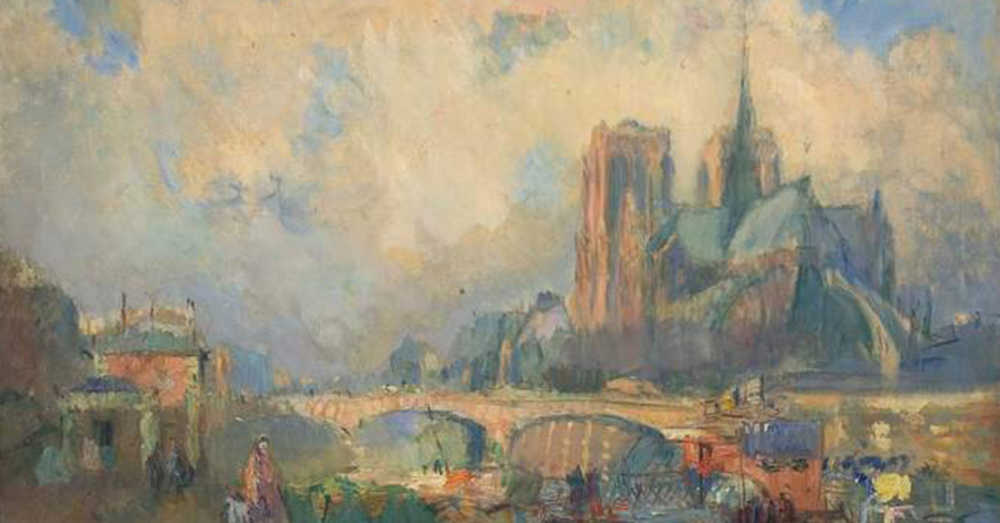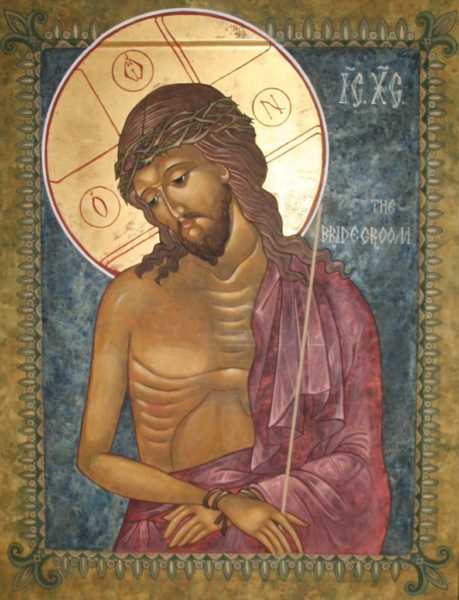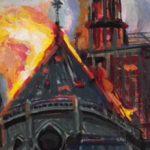We run our website the way we wished the whole internet worked: we provide high quality original content with no ads. We are funded solely by your direct support. Please consider supporting this project.

Notre Dame and Why Beauty Matters
Article by Jordan Sutton, from the Holy Week Art Series at ClearPath.Life
“Is Paris burning?”
That is a direct quote from Adolf Hitler in 1944 on a phone call with his general, Dietrich Hugo Hermann von Choltitz, who oversaw the Nazi occupation of Paris.
Hitler had given his highly decorated general orders to “level” the city of Paris. At the time, Von Choltitz had headquartered his operation at the iconic Hotel Le Meurice which sits on the Jardin des Tuileries. He had been overcome by the beauty, history and culture of Paris and so disobeyed the orders of “The Fuhrer.” Beauty is a force of nature that we can’t fully describe.
Hitler’s question inspired the famed 1966 French film, “Is Paris Burning?”
Those words came to mind as I turned on the news yesterday to see that Notre Dame was in flames.
Some years ago, my wife and I had the great privilege to sit in Sunday mass at the Notre Dame. It’s hard to describe the uniqueness and beauty of this iconic place of worship. It sits on an island in the middle of the Seine River, as a relic of faith, the heartbeat of one of the world’s most progressive and diverse cities.
The Notre Dame has been around for roughly 850 years since construction began and has survived its desecration in the French Revolution and restoration in the middle of the 19th century.
When I saw the burning of its roof, my heart sank. Part of me was wondering why I was so moved. Should I be so moved? There are countless human crises going on around the world that rightfully deserve a deeper churning in my soul than the devastation of a building, whether old or new, plain or immaculate. But I couldn’t shake it; I was moved, nonetheless, as it seems were a host others.
And it kind of begs the question: Why? Why has this place lasted so long? Why are we so moved by the flames filling its walls?
Beauty is likely one of the most underestimated elements of profound importance both in life and in the scriptures. We sing of the beauty of God, the vastness of His love, the majesty of His creative imagination seen in nature, but it seems in our teaching and theology, beauty misses the place of emphasis it deserves.
There was a day in time where art was one of the primary ways the gospel was understood, transmitted, imparted and preserved for people everywhere. People who couldn’t read and didn’t have access to the scriptures would see and remember the great story of the gospel in countless stained glasses pieces, ceiling murals, frescos, statues and other art pieces.
Thankfully after the invention of the printing press and the fruit of the Reformation in the 16th century, people everywhere began interacting with the scriptures for themselves and in their own language. The last 500 years of church evolution have evidenced a more informed and involved church, where all those seeking to more deeply know and express truth in their lives read and study the scriptures, not just those in so-called clergy.
But maybe in this movement toward greater understanding, there is a value that we have overlooked. Maybe we have overestimated figuring it all out and underestimated being captured in wonder.
We often have Bible studies to flesh through the finer points of specific doctrinal truths, but how often do we just read the scripture and smile, breathe deep, sit in silence and awe? How often do we look out an intricate design of a tree or plant and think, wow, God is truly amazing? How often do we gaze upon a piece of art, old or modern, that depicts some element of love, some truth of the gospel and instead of figuring out, just receive?
Receive the beauty of his kingdom.

Consider the piece “Christ our Bridegroom.”
While there is much symbolism in the piece, “Christ our Bridegroom,” the most moving element to me is the gaze of Christ as he awaits his bride. The painting depicts the imagined anticipation of one awaiting, pondering, praying over the time he would be united with his lover.
Solomon beautifully depicts the potency of this union between two lovers, between a bride and her bridegroom, in his opening remarks of the Song of Songs.
Let him kiss me with the kisses of his mouth—for your love is more delightful than wine. Pleasing is the fragrance of your perfumes; your name is like perfume poured out. – Song of Solomon 1:2-3
Jesus is not merely an “icon” or a model of what it means to be good. Jesus is the lover of our souls who woos and waits on us as we persevere in this life under the sheltering of his grace. The union we experience is real and life-giving, but we hope for a deeper connection, a fuller experience of the one who loves us. We are awaiting being fully united with our bridegroom.
The beauty of this piece reminds of that. The beauty of knowing the very reality that he is awaiting us ministers to our souls. It speaks to a place that no principle can.
I can’t give you a 21-part explanation of how Christ is our bridegroom, but I am overwhelmed that the creator of the universe loves us so deeply that he waits for us, weeps for us and is moved by us.
This kind of beauty is at the heart of the gospel. It is at the heart of what it means to be a Christian. It is at the heart of His kingdom coming to earth as it is in heaven.
Jesus didn’t bring redemption to humanity and the entirety of the cosmos through a 4-part sermon or a well-written position paper; He did it through an act…the act of all acts. He stepped into both death and resurrection. And by His bodily death and resurrection, we are drawn by His spirit into the depths of himself and made alive in him.
Wow, what beauty. A beauty that saved the world. [Check our Brian Zahnd’s book Beauty Will Save the World.]
Now as I consider our present situation, the burning of this old cathedral, I recognize that in the end, all will be dust and ash before Him, but maybe, just maybe, there can be a beautiful story that comes from the ashes contained in those walls. Maybe the greatest passion week story that has ever been told by this relic of artistic beauty can still be told.
God is indeed a God of resurrection. And for there to be a resurrection, there must be death.
Isaiah 61 describes God’s beautiful good news for those who have been broken. Let us ponder on these words as we consider Jesus’ great and beautiful sacrifice for us.
The Spirit of the Sovereign Lord is on me,
because the Lord has anointed me
to proclaim good news to the poor.
He has sent me to bind up the brokenhearted,
to proclaim freedom for the captives
and release from darkness for the prisoners,to proclaim the year of the Lord’s favor
and the day of vengeance of our God,
to comfort all who mourn,and provide for those who grieve in Zion—
to bestow on them a crown of beautyinstead of ashes,
the oil of joy
instead of mourning,
and a garment of praise
instead of a spirit of despair.
They will be called oaks of righteousness,
a planting of the Lord
for the display of his splendor.They will rebuild the ancient ruins
and restore the places long devastated;
they will renew the ruined cities
that have been devastated for generations.
And may God raise up the ruins of the beautiful Notre Dame, not as a testimony of the human spirit, but as a reminder of the one who through wisdom laid the foundations of heaven and earth.
____ ____ ____
art: “Paris, the Archbishop’s Bridge and Notre-Dame seen from the Quai de la Tournelle”
by: Albert Lebourg
date: c.1890
Category: General, Guest Contributor
Tags: Art, Beauty, Social Issues
Guest Contributor:

Jordan Sutton is the lead pastor of Clearpath Dallas, a collective of house churches in Dallas, TX. He and his wife, Andrea, are directors of an online magazine, Clearpath.Life, where readers can experience the beauty of the Jesus life. They reside in Dallas with their 3 kids, Grace, Eden and Judah.
Related Reading

Evangelism or Social Action: What’s the Priority?
Throughout the last century Evangelicals were known much more for their emphasis on personal piety than for their social action. This is fortunately beginning to change. Pioneers like Jim Wallis, Tony Campolo and Ron Sider have for decades been trying to get Evangelicals to see that the Bible mandates that followers of Jesus care for…

Don’t Wilberforce’s achievements refute your stance on the separation of faith and politics?
Question: William Wilberforce was a Christian whose passionate involvement in politics almost single-handedly brought an end to the slave trade in 19th century England. Don’t his achievements show the importance of Christians being involved in politics, thus refuting your contention that Christian’s should keep their faith and values separate from politics? Answer: First, while I…

homosexuality, truth telling, and love
A Guy Taking Pictures via Compfight A couple weeks ago, we posted a portion of Greg’s sermon (and his comments) on the marriage amendment in Minnesota, homosexuality and finding a “Third Way”. Today we’re continuing the conversation by linking to a blog post by Sarah Bessey called In which I tell you the truth about…

Take America (& the World) Back for God?
Kai Schreiber via Compfight Recently Missio Alliance has hosted a series of posts entitled “Christianity and Violence.” Since Greg has written quite a lot on this topic from the point of view of pacifism, we thought it timely to weigh in on this topic. The following excerpt is quoted from his chapter, “Taking America Back…

Notre Dame on Fire (Saturday Art Share)
While fire overtook Notre Dame in April, people asked many questions. Did terrorists do this? Did God do this? Would the fire spread? Was this the end of an era? Did this represent the end of Christianity? How would the world change? It was a moment that made you realize a building was more than…

What do you think of the left wing Christians who are calling on Christians to stand up for “biblical justice”?
Yes, we’ve been hearing a lot of this recently, especially from more “progressive” (left-tending) Christians calling on people to vote “God’s politics” and stand up for “biblical justice.” On the one hand, I along with everyone else applaud such rhetoric, for what Bible-believing Christian in their right mind would take a stand against “biblical justice”?…
